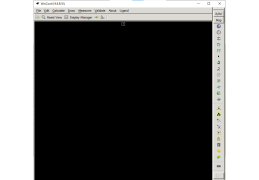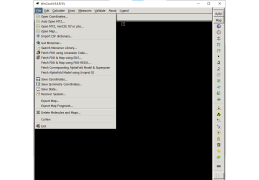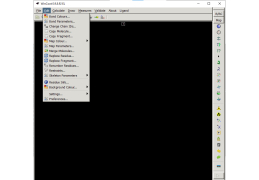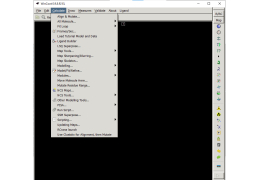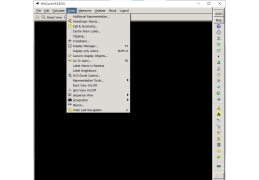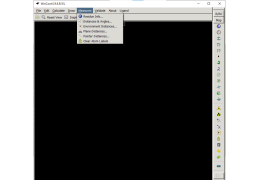
Coot
by Paul Emsley
Coot is a molecular-graphics program for macromolecular model building, model completion and validation, particularly suitable for proteins.
Coot is a software package used in macromolecular crystallography for model building, validation, and analysis. It is an open-source graphical user interface (GUI) to the Crystallographic Object-Oriented Toolkit (COOT) library, which is a library of C++ objects and functions for macromolecular crystallography. The use of Coot is to interactively build and refine protein and nucleic acid models, using the electron density maps from X-ray crystallography and non-crystallographic symmetry (NCS) data. Coot can also be used to visualize maps, density, and models.
1. Model Building: Coot provides tools for building and refining protein and nucleic acid models. It can also use NCS data to extend and refine existing models.
2. Model Validation: Coot has a comprehensive set of model validation tools, including Ramachandran plots, rotamer analysis, and clash analysis.
3. Map Visualization: Coot provides an interactive graphics interface to view electron density maps, including 2D and 3D visualizations.
4. Model Visualization: Coot can visualize models in both 2D and 3D, with the ability to rotate, zoom, and pan the model.
5. Map/Model Comparison: Coot can compare maps to models, and display the differences between them.
6. Scripting: Coot has an embedded scripting language that can be used to automate the model building and refinement process.
7. Refinement: Coot has tools for refining models and maps, including real-space refinement and simulated annealing.
8. Molecular Dynamics: Coot has a built-in molecular dynamics engine that can be used to simulate the movement of molecular structures.
9. Analysis: Coot has a suite of analysis tools, such as residue analysis, solvent accessibility analysis, and bond analysis.
10. Database Search: Coot has a built-in search engine that can be used to search databases such as PDB and RCSB for similar structures.
11. Export: Coot can export models and maps in a variety of formats, including CIF, PDB, and Mol2.
Overall, Coot is a powerful and comprehensive software package for macromolecular crystallography. It is an open-source, user-friendly GUI that can be used for model building, validation, visualization, and analysis. It also has a number of advanced features, such as scripting, map/model comparison, and database search.
Coot provides an easy to use interface for studying 3D structures of macromolecules and analyzing their properties.Features:
1. Model Building: Coot provides tools for building and refining protein and nucleic acid models. It can also use NCS data to extend and refine existing models.
2. Model Validation: Coot has a comprehensive set of model validation tools, including Ramachandran plots, rotamer analysis, and clash analysis.
3. Map Visualization: Coot provides an interactive graphics interface to view electron density maps, including 2D and 3D visualizations.
4. Model Visualization: Coot can visualize models in both 2D and 3D, with the ability to rotate, zoom, and pan the model.
5. Map/Model Comparison: Coot can compare maps to models, and display the differences between them.
6. Scripting: Coot has an embedded scripting language that can be used to automate the model building and refinement process.
7. Refinement: Coot has tools for refining models and maps, including real-space refinement and simulated annealing.
8. Molecular Dynamics: Coot has a built-in molecular dynamics engine that can be used to simulate the movement of molecular structures.
9. Analysis: Coot has a suite of analysis tools, such as residue analysis, solvent accessibility analysis, and bond analysis.
10. Database Search: Coot has a built-in search engine that can be used to search databases such as PDB and RCSB for similar structures.
11. Export: Coot can export models and maps in a variety of formats, including CIF, PDB, and Mol2.
Overall, Coot is a powerful and comprehensive software package for macromolecular crystallography. It is an open-source, user-friendly GUI that can be used for model building, validation, visualization, and analysis. It also has a number of advanced features, such as scripting, map/model comparison, and database search.
Coot is a free graphics program that is designed to interactively manipulate macromolecular 3D structures. It is cross-platform, so the hardware and software requirements vary depending on the operating system used.
Hardware:
• A modern computer with an Intel or AMD processor.
• A fast graphics card with at least OpenGL 1.2 support.
• At least 2GB of RAM.
Software:
• An operating system such as Linux, macOS, or Windows.
• A web browser such as Chrome or Firefox.
• A C and C++ compiler such as gcc or clang.
• The GTK+ library.
• The FFTW library.
• The GLib library.
• The GtkGLExt library.
• The Python interpreter.
Hardware:
• A modern computer with an Intel or AMD processor.
• A fast graphics card with at least OpenGL 1.2 support.
• At least 2GB of RAM.
Software:
• An operating system such as Linux, macOS, or Windows.
• A web browser such as Chrome or Firefox.
• A C and C++ compiler such as gcc or clang.
• The GTK+ library.
• The FFTW library.
• The GLib library.
• The GtkGLExt library.
• The Python interpreter.
PROS
Provided without charge, making it accessible for all users.
Interactive interface simplifies complex molecular modeling.
Regular updates ensure improved features and bug fixes.
Interactive interface simplifies complex molecular modeling.
Regular updates ensure improved features and bug fixes.
CONS
Steep learning curve for beginners in molecular visualization.
Occasional crashes and glitches impact workflow.
Limited customer support for troubleshooting issues.
Occasional crashes and glitches impact workflow.
Limited customer support for troubleshooting issues.
Jamie Q*******o
I have been using Coot software for a couple of months now. It has been really helpful in solving my modelling problems. The interface is easy to use and the visualization of the models is quite good. With its wide range of features, it has been easy to create and modify models. The tool also allows for easy manipulation of the model and for viewing different representations of the same model. It is also quite fast in comparison to other similar softwares. The only downside I have encountered is that sometimes the program crashes or takes a while to respond.


